Marine Turned Author Bill Bee on Dodging Death in Marjah and His New Book, ‘The Shot’
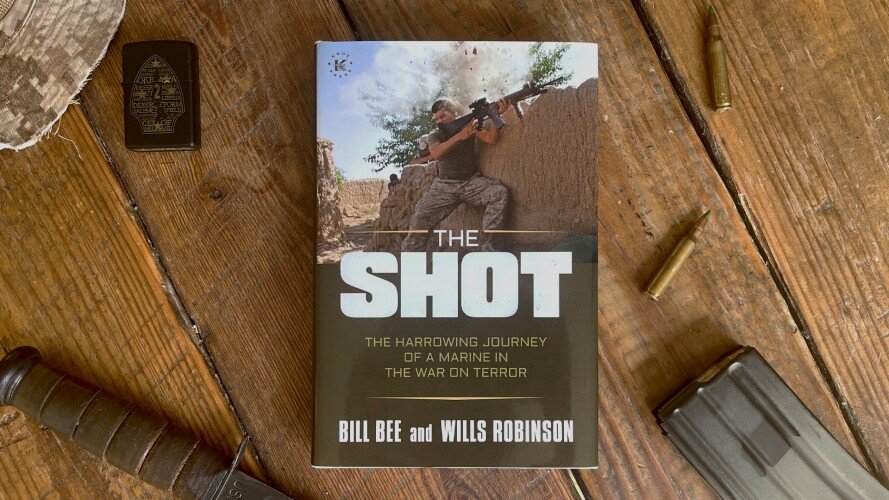
New memoir, The Shot, follows Marine from iconic war photo through four deployments to Afghanistan. Photo by Mac Caltrider/Coffee or Die Magazine.
Last August, while the world watched American service members struggle to hold the line at Hamid Karzai International Airport in Kabul, Bill Bee, who had been among the first Marines to deploy to Afghanistan 20 years earlier, was hard at work on a memoir. When completed, the book would recount Bee’s time fighting in America’s longest war, from the onset of the conflict through the troop surge ordered by President Barack Obama in 2009.
Parts of Bee’s story had been told before. During his third — and next to last — deployment to Afghanistan, Reuters photographer Goran Tomasevic snapped a photo of him just as a Taliban sniper’s bullet smashed into the mud wall in front of his face and knocked him unconscious. The photo became an iconic image of the war. Now, more than a decade after it was taken, it appears on the cover of Bee’s finished memoir, The Shot.
Co-authored with journalist Wills Robinson, The Shot hit shelves Tuesday, Sept. 13. Coffee or Die Magazine sat down with Bee to discuss, among other things, how the book came to fruition. In our interview, which has been lightly edited for length and clarity, the 40-year-old Ohio native talked about his transformation from high school band geek to Marine grunt, his experiences fighting the Taliban in Helmand province, and why he thinks so many people these days take themselves too seriously.
This interview has been edited for length and clarity.
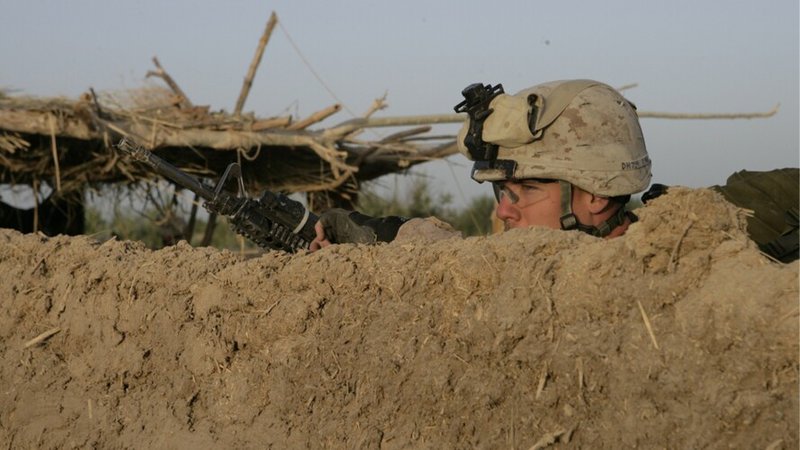
Marines with Bravo Company, 1st Battalion, 6th Marine Regiment, 24th Marine Expeditionary Unit, International Security Assistance Force, operating in Garmsir, Helmand province, Afghanistan. US Marine Corps photo by Cpl. Andrew Carlson.
COD: How did you go from being a self-proclaimed “band geek” to joining the Marine Corps infantry?
BB: I always knew I was going to join one of the branches. Service is a pretty big tradition in my family. Every male served in some way, shape, or form. We actually traced our family’s military service back to 1619, so the family tradition was a big part of it. Initially I was going to join the Marine Corps band, because I was a huge band geek in high school, but about halfway through my senior year I just changed my mind and told my recruiter I wanted to be a grunt.
COD: You graduated from boot camp in 2000, less than a year before Sept. 11 happened. How did that change the trajectory of your service?
BB: We were expecting a booze cruise to the Mediterranean. We’d just completed our work-up, I’d done the scout swimmer thing, and then we were actually on pre-deployment leave when 9/11 went down. Everybody got called back. They were talking about sending us up to New York to deal with recovery stuff, but instead they just shipped us overseas. We actually went to the Arabian Sea first, where my first mission was a visit, board, search, and seizure mission (VBSS). It was our scout swimmer teams and a team of SEALs, and we fast-roped onto a Chinese supertanker that we thought had some of Usama bin Laden’s kids on it. Turns out we didn't find shit-all except rice, but it was still a pretty interesting experience for my first mission.
We occupied FOB Rhino just before Christmas 2001, but pretty soon after that they stuck our battalion in a 360 around Kandahar Airfield, just manning fighting holes. We sat there for like two months. It was miserable. When we finally went home we didn’t even spend six months stateside before deploying to Afghanistan again.
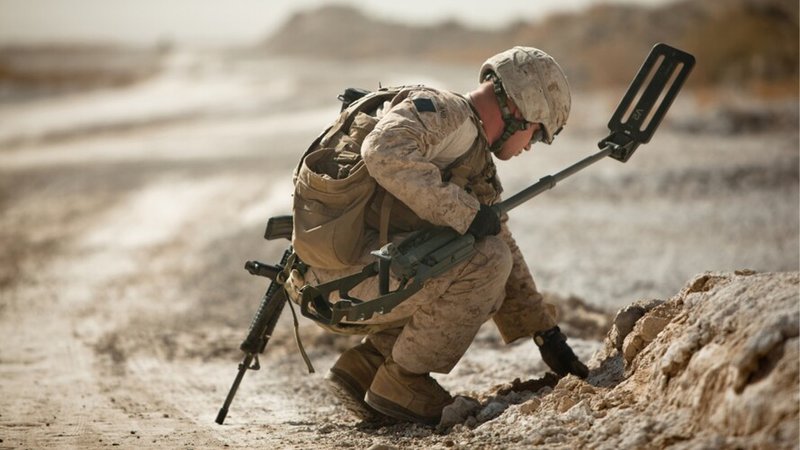
Lance Cpl. Bobby Winland, a combat engineer with Bridge Platoon, Alpha Company, 9th Engineer Support Battalion, checks for improvised explosive devices before his platoon can begin construction on a bridge in Garmsir, Helmand province, Afghanistan, Jan. 29, 2012. US Marine Corps photo by Cpl. Bryan Nygaard.
COD: You guys didn’t waste much time getting back in the fight. What was that second deployment like?
BB: At that time we had a unit in Djibouti, a unit in Guantanamo, and a unit in Kabul guarding the embassy because they didn't want just the security force guys there, they wanted a full infantry company. We spent four months at the embassy in Kabul and were still there when Iraq was invaded. So we were a bunch of salty guys sitting around the embassy watching all the fun go down in Iraq without us. We were also freezing our asses off. That's got to be the coldest environment I've ever been in. We were standing post in our black sleeping bags. Our rules of engagement were actually more permissive at the embassy than they’d been in Kandahar. That said, we really didn't do much there. We took a couple of sniper rounds and had a couple IEDs get put in trash cans, but it was really a show of force more than anything.
COD: So aside from freezing, it wasn’t until your third and fourth deployments to Afghanistan that things got really hairy?
BB: Yeah. By the time I went over a third time the war had changed. After a stint on recruiting duty I got sent to 1st Battalion, 6th Marines, who had just come back from Ramadi. So those guys had lots of experience fighting in urban environments, but not much when it came to open fields like we found in Helmand in 2008.
That was the first time I was ever in a free-fire area and it was nuts. The Taliban had gone door to door and told civilians to leave the area because they were getting ready for a fight. When we hit Garmsir it was pretty intense. We were in contact almost immediately, and for the first couple of months it was probably three firefights a day. One in the morning, one in the afternoon, and one at night.
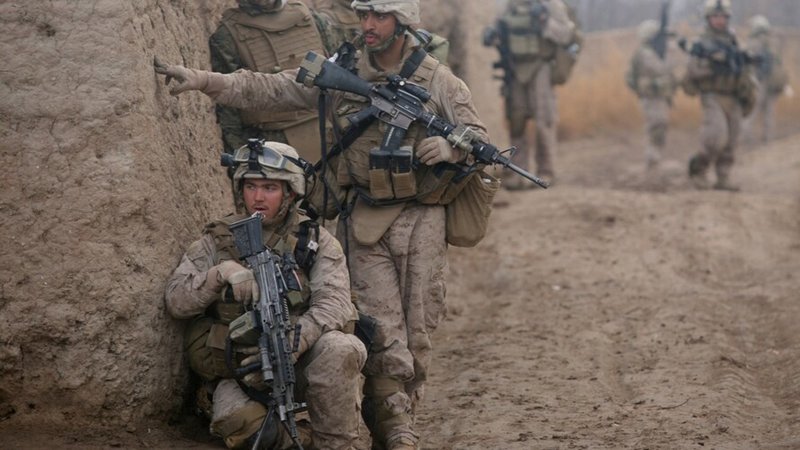
Marines with India Company, 3rd Battalion, 6th Marine Regiment, investigate a possible IED while on patrol in 2010. US Marine Corps photo by Lance Cpl. Tommy Bellegarde.
COD: Two months after you got to Helmand, a photographer snapped that iconic photograph of a bullet narrowly missing your head. What was going on that day?
BB: A whole lot of nothing. By then it was May and lead-melting hot. My guys were standing post, and I was literally just sitting there hand-washing my clothes when I heard one shot from a rifle. We knew Taliban marksmen had moved into the area, so I went over to check on my boy standing post to make sure he was okay and to try and figure out where the hell the round came from. I saw a curtain move — not even 100 yards from where the post was — so I sighted in on it and was waiting for a face to pop up when all of a sudden shit went dark. I had no idea what happened. I woke up on a stretcher, with a medevac bird inbound. I have no recollection of it whatsoever.
I had a screaming headache from the ricochet and debris hitting my head, but that was really it, so we called the bird off. Then Goran Tomasevic, a photographer embedded with us, came up to me and said, “You’re not going to believe this picture.” Goran didn't even intend to take a series of photos; he was testing a new lens and hit the button without realizing it was in sequence mode.
That night we destroyed the building the sniper had been in and then sent a rifle squad and a STA team out there to check. Those guys got ambushed and one of our scout snipers took a round to the head. That one was kind of rough because they got him back to our compound and were doing a cricothyrotomy on him. I'm literally holding his hand trying to talk to him and he's just lights out. It was fucking miserable. That was the first time I ever had to deal with not only one of our guys being a casualty, but actually losing him too. He was the only Marine killed in action during that deployment.
COD: After surviving a brush with death in 2008, you went back to Helmand in 2010. Did you expect that deployment to be more of the same?
BB: Well, we were initially supposed to go to Iraq, but they changed that up like halfway through our work-up. We were told we were going to be part of some big push through Marjah. I thought Garmsir was rough, but Marjah was the most insane deployment I've ever been on. Just for the sheer amount of fire we dealt with. Before we even inserted into Marjah we helped clear out an area near an artillery position called Fiddler’s Green. During that first patrol outside Fiddler’s Green, the enemy was so close we were literally throwing grenades at dudes. That was like a warmup for Marjah.
We went in on Valentine's Day 2010 in Ospreys. I remember looking out the window and you could see the tracer fire from the anti-air popping up at the Ospreys, like some insane Vietnam-level shit. That deployment got pretty hairy, pretty quick. We weren't even there a week when we took our first casualty. A Marine took a gunshot wound to the head, so my squad went out and helped carry him back. It was the same thing as 2008. I'm sitting there holding his hand, Doc's doing a cric on him. Tried to get him out of there in time, but we ended up losing him too. That kind of set the whole feeling for that entire deployment. Getting the guys home became the priority after that.
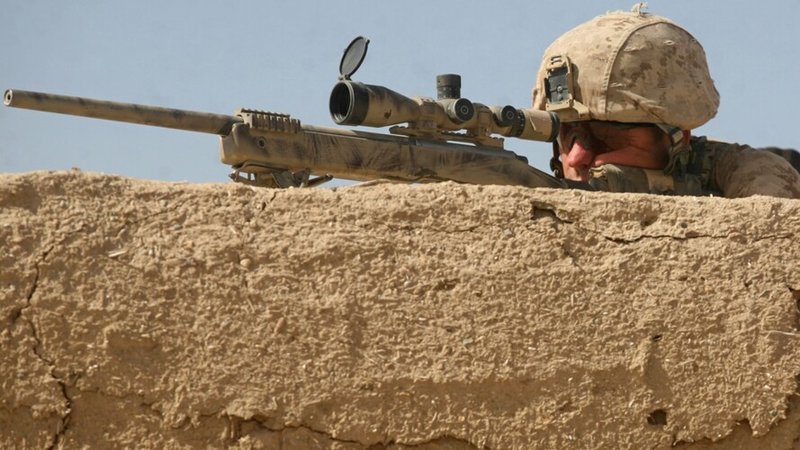
Sgt. Rick Keller, a scout sniper with 3rd Platoon, India Company, 3rd Battalion, 6th Marine Regiment, provides security from a compound in Marjah, Helmand province, Afghanistan, Feb. 16, 2010. US Marine Corps photo by Lance Cpl. Tommy Bellegarde.
COD: And you ended up getting wounded again during that deployment?
BB: Yeah, it was about six days before we were supposed to fly out. We were doing left seat, right seat with the unit relieving us and I took two of their squad leaders on patrol with me. We weren’t even going further than like 700 yards because I wasn't trying to get in contact. I was just trying to show those guys where the Taliban typically were. We ended up going into a compound after my designated marksman dropped a dude. He called me over and I took a knee next to him. That's when the whole building blew up. The two squad leaders from the new unit got smoked instantly. Most of my squad got casevaced. I don't remember any of it. I literally woke up inside the MRI machine at Camp Dwyer.
COD: You ended up getting out of the Marine Corps after that deployment, but you didn’t talk about your experiences until recently. What inspired you to finally share your story?
BB: Honestly, it was Wills Robinson, the co-author. I had been approached by the media before about the picture and I had no desire to talk about any of that shit because my head was still in some pretty dark places at the time. But then Wills mailed me a handwritten letter and I must have held on to that thing for like two months because he wasn't just asking about the picture. He was asking how I was doing and how everything was going with the VA. I was having some big issues with the VA at the time and so I was like, “You know what, fuck this. I'm going to tell this guy everything.” That's exactly what I did, just went full-bore and held nothing back. I told him everything about deployments, my bad leadership, the VA, everything. He put that into an article and within two days, the VA called saying, “Oh, those debts that we weren't paying for are covered now, and we will get you straight into care.” It shouldn't take a damn news article to get help when you ask for it.
Later, Wills approached me about a book, and since then he’s been amazing. He helped translate from grunt-speak to English. He was cool as hell about it all. It was years of work, so when we finally got the book in hand it was a surreal experience. You know, I was just a normal grunt and, shit, I wasn't even really outstanding at that. There's 10,000 guys I know that have better stories than me. I just lucked out and had my picture taken once. The other thing is that too many people take themselves too seriously. Like, I literally ordered a mushroom stamp, so I can mushroom stamp every book I send to guys I know.
Read Next: America’s Longest War: 5 Essential Books About Afghanistan
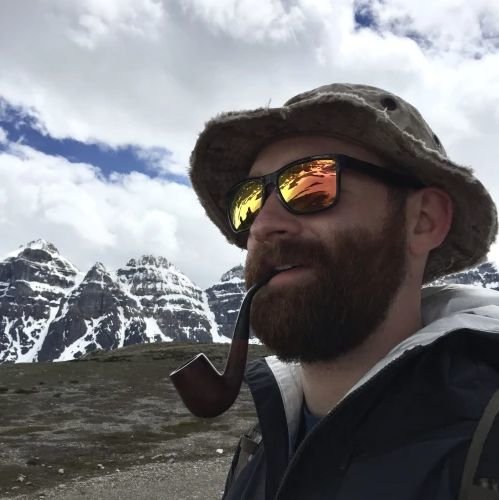
Mac Caltrider is a senior staff writer for Coffee or Die Magazine. He served in the US Marine Corps and is a former police officer. Caltrider earned his bachelor’s degree in history and now reads anything he can get his hands on. He is also the creator of Pipes & Pages, a site intended to increase readership among enlisted troops. Caltrider spends most of his time reading, writing, and waging a one-man war against premature hair loss.
BRCC and Bad Moon Print Press team up for an exclusive, limited-edition T-shirt design!
BRCC partners with Team Room Design for an exclusive T-shirt release!
Thirty Seconds Out has partnered with BRCC for an exclusive shirt design invoking the God of Winter.
Lucas O'Hara of Grizzly Forge has teamed up with BRCC for a badass, exclusive Shirt Club T-shirt design featuring his most popular knife and tiomahawk.
Coffee or Die sits down with one of the graphic designers behind Black Rifle Coffee's signature look and vibe.
Biden will award the Medal of Honor to a Vietnam War Army helicopter pilot who risked his life to save a reconnaissance team from almost certain death.
Ever wonder how much Jack Mandaville would f*ck sh*t up if he went back in time? The American Revolution didn't even see him coming.
A nearly 200-year-old West Point time capsule that at first appeared to yield little more than dust contains hidden treasure, the US Military Academy said.












